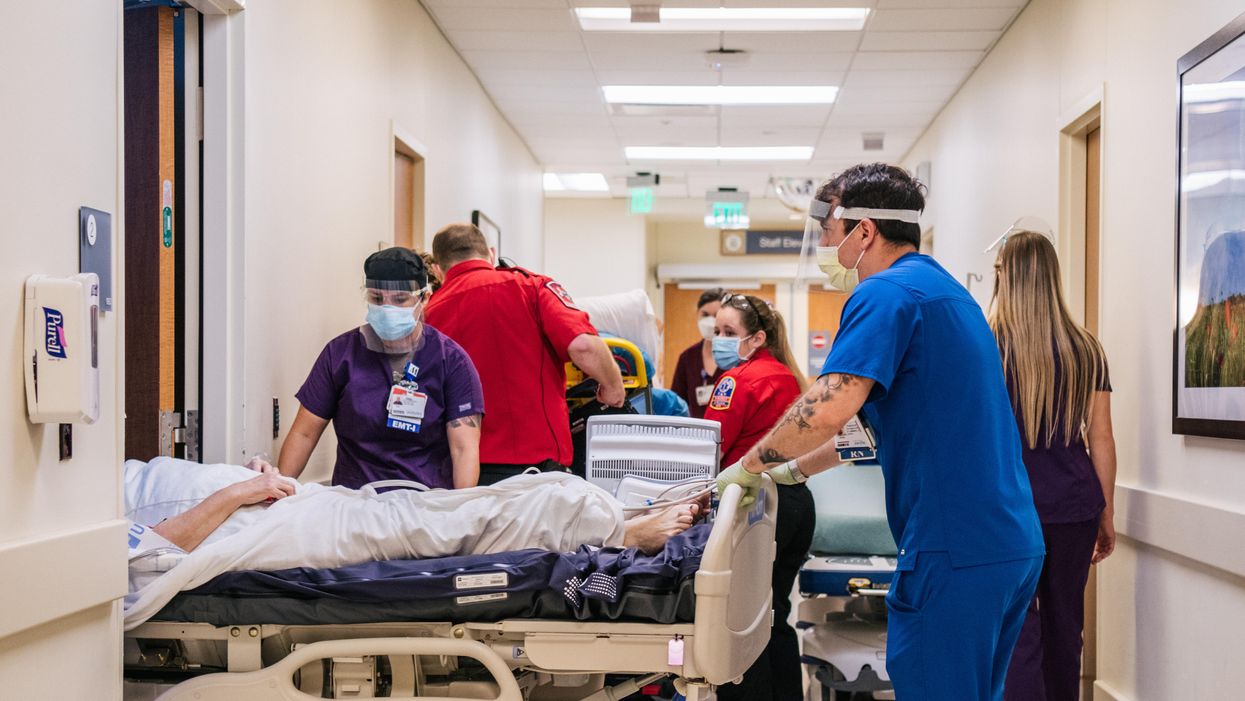In honor of National Depression and Mental Health Screening Month, let's support our health care workers.
October is National Depression and Mental Health Screening month. Over the past year and a half, health care workers across the United States have tackled the Covid-19 pandemic on the frontlines day after day. They have cared for those we love with empathy, compassion and lifesaving critical skills. They are taking care of us — but who is taking care of them?
Our health care professionals have been tirelessly working under nearly impossible and unsustainable levels of stress to keep their communities safe, and it's taking a toll. In a recent study of frontline health care workers, 55 percent have self-reported burnout, and 62 percent say the pandemic has had a negative impact on their mental health. Alarmingly, three in 10 health care workers have considered leaving their chosen profession altogether during this pandemic.
What's more, 41 percent of our health care workers are millennials, and they will continue to comprise the health care workforce for decades to come. And yet, national labor shortages are forcing fewer employees to shoulder more of the work: The American Nursing Association estimates a need for 1.1 million registered nurses in the U.S. by 2022. It is of paramount importance that we work to create a sustainable health care system that takes care of its workers — not just to ensure great outcomes for patients, but also to retain and attract the hardworking health care staff we depend on.
Amidst staggering numbers of hospital admissions and new Covid-19 cases, our health care infrastructure is at a critical point: Our health care workers are in desperate need of support. The good news is that each of us can make a difference, today. In observance of National Depression and Mental Health Screening Month, here's how you can help:.
- Recognize their efforts and sacrifice. First and foremost, thank them for their service. Whether this is on a personal level by checking in with friends and family who work in health care, or on a macro level by organizing community events to share their critical needs and perspectives from the frontlines, providing space to let them share what they have seen and are experiencing can be critical.
- Build trust with one another by listening to the advice of our trusted medical professionals. They've devoted years of training, studying and practice to fulfill the call for a cause bigger than themselves.
- Find the resources those working in health care ask for. Does your friend need help finding a therapist? Does your local hospital need more volunteers? Does your city need more contact tracers? There are lots of ways to help those on the frontlines without having formal medical training.
The effects of doing this work now will be long lasting. Young people are at the beginning of their careers, with so much possibility and talent. It is in our best interest to create a culture of support — especially as it relates to mental health — in the workplace for these early professionals so they can continue to grow into the leaders and pioneers that make America, well, America. If we act now, we can do more than just guard against future workforce shortages. We can instill a culture of support, empathy, and care — for everyone in the health care system.




















Eric Trump, the newly appointed ALT5 board director of World Liberty Financial, walks outside of the NASDAQ in Times Square as they mark the $1.5- billion partnership between World Liberty Financial and ALT5 Sigma with the ringing of the NASDAQ opening bell, on Aug. 13, 2025, in New York City.
Why does the Trump family always get a pass?
Deputy Attorney General Todd Blanche joined ABC’s “This Week” on Sunday to defend or explain a lot of controversies for the Trump administration: the Epstein files release, the events in Minneapolis, etc. He was also asked about possible conflicts of interest between President Trump’s family business and his job. Specifically, Blanche was asked about a very sketchy deal Trump’s son Eric signed with the UAE’s national security adviser, Sheikh Tahnoon.
Shortly before Trump was inaugurated in early 2025, Tahnoon invested $500 million in the Trump-owned World Liberty, a then newly launched cryptocurrency outfit. A few months later, UAE was granted permission to purchase sensitive American AI chips. According to the Wall Street Journal, which broke the story, “the deal marks something unprecedented in American politics: a foreign government official taking a major ownership stake in an incoming U.S. president’s company.”
“How do you respond to those who say this is a serious conflict of interest?” ABC host George Stephanopoulos asked.
“I love it when these papers talk about something being unprecedented or never happening before,” Blanche replied, “as if the Biden family and the Biden administration didn’t do exactly the same thing, and they were just in office.”
Blanche went on to boast about how the president is utterly transparent regarding his questionable business practices: “I don’t have a comment on it beyond Trump has been completely transparent when his family travels for business reasons. They don’t do so in secret. We don’t learn about it when we find a laptop a few years later. We learn about it when it’s happening.”
Sadly, Stephanopoulos didn’t offer the obvious response, which may have gone something like this: “OK, but the president and countless leading Republicans insisted that President Biden was the head of what they dubbed ‘the Biden Crime family’ and insisted his business dealings were corrupt, and indeed that his corruption merited impeachment. So how is being ‘transparent’ about similar corruption a defense?”
Now, I should be clear that I do think the Biden family’s business dealings were corrupt, whether or not laws were broken. Others disagree. I also think Trump’s business dealings appear to be worse in many ways than even what Biden was alleged to have done. But none of that is relevant. The standard set by Trump and Republicans is the relevant political standard, and by the deputy attorney general’s own account, the Trump administration is doing “exactly the same thing,” just more openly.
Since when is being more transparent about wrongdoing a defense? Try telling a cop or judge, “Yes, I robbed that bank. I’ve been completely transparent about that. So, what’s the big deal?”
This is just a small example of the broader dysfunction in the way we talk about politics.
Americans have a special hatred for hypocrisy. I think it goes back to the founding era. As Alexis de Tocqueville observed in “Democracy In America,” the old world had a different way of dealing with the moral shortcomings of leaders. Rank had its privileges. Nobles, never mind kings, were entitled to behave in ways that were forbidden to the little people.
In America, titles of nobility were banned in the Constitution and in our democratic culture. In a society built on notions of equality (the obvious exceptions of Black people, women, Native Americans notwithstanding) no one has access to special carve-outs or exemptions as to what is right and wrong. Claiming them, particularly in secret, feels like a betrayal against the whole idea of equality.
The problem in the modern era is that elites — of all ideological stripes — have violated that bargain. The result isn’t that we’ve abandoned any notion of right and wrong. Instead, by elevating hypocrisy to the greatest of sins, we end up weaponizing the principles, using them as a cudgel against the other side but not against our own.
Pick an issue: violent rhetoric by politicians, sexual misconduct, corruption and so on. With every revelation, almost immediately the debate becomes a riot of whataboutism. Team A says that Team B has no right to criticize because they did the same thing. Team B points out that Team A has switched positions. Everyone has a point. And everyone is missing the point.
Sure, hypocrisy is a moral failing, and partisan inconsistency is an intellectual one. But neither changes the objective facts. This is something you’re supposed to learn as a child: It doesn’t matter what everyone else is doing or saying, wrong is wrong. It’s also something lawyers like Mr. Blanche are supposed to know. Telling a judge that the hypocrisy of the prosecutor — or your client’s transparency — means your client did nothing wrong would earn you nothing but a laugh.
Jonah Goldberg is editor-in-chief of The Dispatch and the host of The Remnant podcast. His Twitter handle is @JonahDispatch.